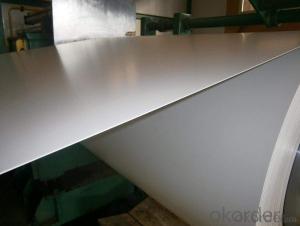Color Coating Aluminium Coil PVDF Painting for Curtain Wall
- Loading Port:
- Shanghai
- Payment Terms:
- TT OR LC
- Min Order Qty:
- 5 m.t.
- Supply Capability:
- 10000 m.t./month
OKorder Service Pledge
OKorder Financial Service
You Might Also Like
Item specifice
1. Specification of Color Coating Aluminium Coil PVDF Painting for Curtain Wall
Material | Alloy Aluminum 1XXX,3XXX,5XXX or customer nominated |
Temper | T3, T4, T5, T6 |
Surface | Anodize, electrophoresis, powder coating,PVDF coating, wood grain painting, matted, etc. |
Colour | Any colour based on Standard Germany RAL Mark |
Length | Coating 6.5 meters, Anodizing 6.5 meters, Mill finish 5 meters |
Press Machine | 500-4000 tons all together 64 press lines. |
Fabrication | 1. Windows and doors; 2. Drilling; 3. Bending; 4. Cutting; 5. etc. |
Certificate | ISO 9001 |
Moulding | 1. Using our moulds, no fee; |
2. Using customer drawing, opening mould, usually about 10~50 tons then the moulding can be refunded. | |
3. Mould cost is negotiable base on the order quantity | |
Capability | Annual output 100,000 tons |
2. Application of Color Coating Aluminium Coil PVDF Painting for Curtain Wall
(1).Interior: wall cladding, ceilings, bathrooms, kitchens and balconies, shutters, doors...
(2).Exterior: wall cladding, facades, roofing, canopies, tunnels,column covers , renovations...
(3).Advertisement: display platforms, signboards, fascia, shop fronts...
3. Feature of Color Coating Aluminium Coil PVDF Painting for Curtain Wall
Be free from Oil Stain, Dent, Inclusion, Scratches, Stain, Oxide Dicoloration, Breaks, Corrosion, Roll Marks, Dirt Streaks and other defect which will interfere with use
4. Certificate:
SGS and ROHS(if client request, paid by client), MTC(plant provided), Certificate of Origin(FORM A, FORM E, CO), Bureau Veritas and SGS (if client request, paid by client), CIQS certificate
5. Image of Color Coating Aluminium Coil PVDF Painting for Curtain Wall
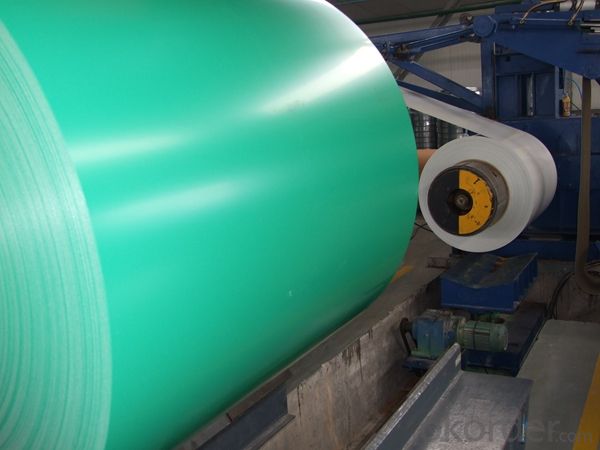
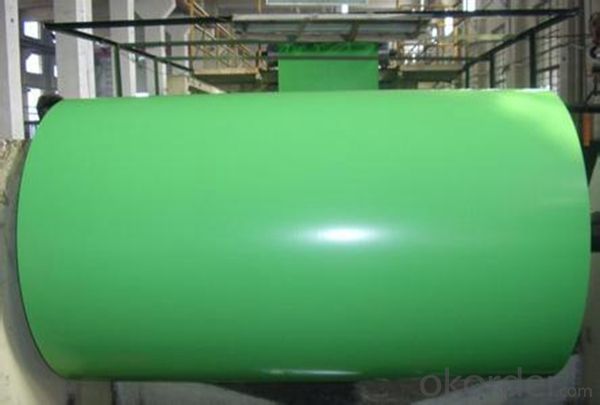
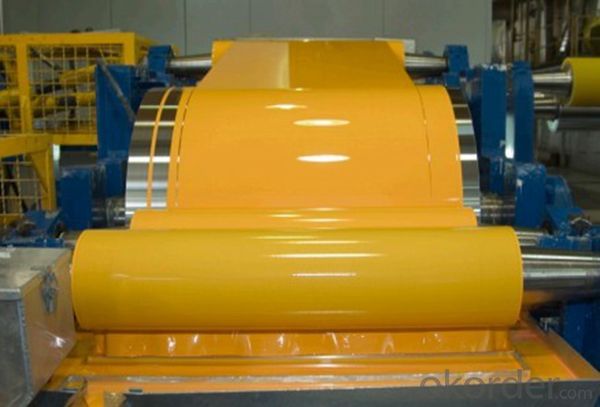
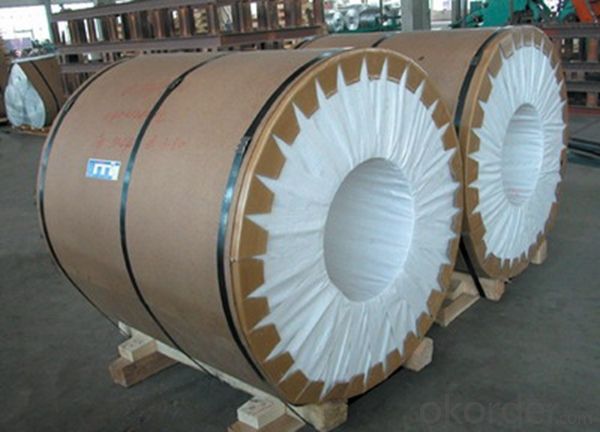
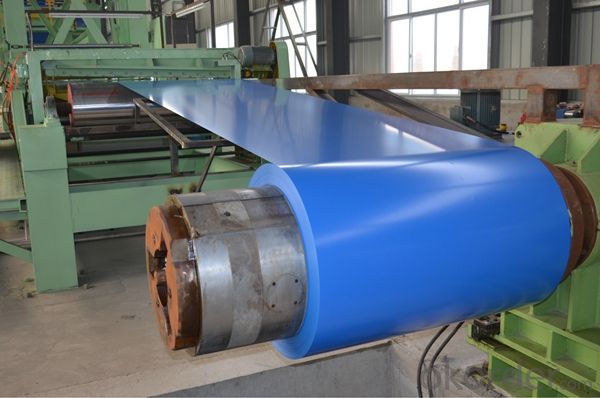
6. Package and shipping of Color Coating Aluminium Coil PVDF Painting for Curtain Wall
eye to wall
eye to the wall
with wood pallet (wooded case also available)
7. FAQ
1) What is the delivery time?
Dpends on actual order, around 20 to 35 days
2)What is the QC system:
We have QC staff of 20 persons and advanced equipment, each production is with MTC traced from Aluminum ingot lot.
3) What market do you mainly sell to?
Australia, America, Asia, Middle East, Western Europe, Africa etc
- Q:What is the impact resistance of aluminum coils?
- The impact resistance of aluminum coils can vary depending on the specific alloy and temper of the aluminum. Generally, aluminum is known for its good impact resistance due to its inherent strength and ductility. Aluminum coils are often used in applications where they may be subjected to impact or mechanical stress, such as in the automotive industry, construction, or packaging. Aluminum alloys, such as 3003, 5052, or 6061, are commonly used for manufacturing coils. These alloys are known for their high tensile strength, which contributes to their impact resistance. Additionally, aluminum has the ability to absorb and distribute energy upon impact, which helps to reduce the risk of damage or deformation. However, it is important to note that the impact resistance of aluminum coils can also be influenced by other factors such as the thickness of the coil, the surface finish, and any additional protective coatings or treatments applied. Thicker coils generally offer higher impact resistance, while coatings or treatments can enhance the durability and resistance to impact. Ultimately, the impact resistance of aluminum coils can be considered good, but it is always recommended to consult with a manufacturer or supplier to determine the specific impact resistance properties of the chosen aluminum alloy and coil.
- Q:What is the impact of alloy purity on the performance of aluminum coils?
- The purity of alloys used in aluminum coils has a significant impact on their performance. Alloy purity refers to the absence of impurities or contaminants within the aluminum material. One crucial factor affected by alloy purity is the mechanical strength of the aluminum coils. Impurities in the alloy can weaken the overall structure and reduce its tensile strength. Higher purity alloys tend to have better mechanical properties, allowing the coils to withstand higher loads and stresses without deformation or failure. Alloy purity also influences the electrical conductivity of aluminum coils. Impurities such as iron, copper, or silicon can increase the electrical resistance, leading to losses in electrical energy during transmission. Higher purity alloys have lower electrical resistivity, ensuring efficient power transmission and minimizing energy losses. Another critical aspect influenced by alloy purity is the corrosion resistance of aluminum coils. Impurities can act as catalysts for corrosion, reducing the coil's lifespan and durability. Higher purity alloys exhibit improved resistance to corrosion, making them suitable for various applications, including those in corrosive environments. Additionally, the thermal conductivity of aluminum coils is affected by alloy purity. Impurities hinder the efficient transfer of heat, reducing the overall thermal performance. Higher purity alloys have better thermal conductivity, allowing for effective heat dissipation and improved thermal management in applications such as heat exchangers or cooling systems. In conclusion, the impact of alloy purity on the performance of aluminum coils is significant. Higher purity alloys offer improved mechanical strength, electrical conductivity, corrosion resistance, and thermal conductivity. Thus, selecting alloys with higher purity levels is crucial for ensuring optimal performance and longevity of aluminum coils in various applications.
- Q:Can aluminum coils be used in the production of cryogenic storage tanks?
- Yes, aluminum coils can be used in the production of cryogenic storage tanks. Aluminum is a suitable material for cryogenic applications due to its low density, high thermal conductivity, and excellent corrosion resistance. These properties make it ideal for storing and transporting cryogenic liquids such as liquid nitrogen, oxygen, and argon. Aluminum coils can be used to fabricate the inner shell of the storage tank, providing a lightweight and durable solution. Additionally, aluminum is easily formable, allowing for the creation of complex tank shapes and designs. However, it is important to note that aluminum has a higher coefficient of thermal expansion compared to other materials like stainless steel, so proper design considerations must be taken to accommodate for thermal contraction and expansion during cryogenic operations.
- Q:Does anyone know if aluminum skateboards are good?
- I haven't seen one since the old QuickSilver-Silver Surfer(circa 1979). They look great, but they become useless when scratched. Which means....you can't really use them for anything. They're not as flexible as wood....and.......Wait until you get hit in the shin with an aluminum skateboard. Aircraft metal my(explicative deleted). My guess is they're inexpensive because they're trying to get the word out. The company owners probably no very little about skateboarding.
- Q:I am trying to electropolish the surface of a 3003 aluminum sample to analyze in the SEM. I was wondering if anyone knew what electrolyte and electropolishing paramaters work for this alloy. So far I have used phosporic+ethanol+water at 50V for 2 minutes with minimal success.
- Aluminium needs deoxidizing also called as desmutting after electropolishing. This is done in a hot chromic acid bath for nearly for 5 minutes.
- Q:What is the hardness of aluminum coils?
- The hardness of aluminum coils is subject to change due to several factors, including the particular alloy employed and the applied tempering process. Typically, in comparison to other metals, aluminum coils exhibit relatively low hardness. Aluminum is esteemed for its lightweight and pliable characteristics, rendering it effortlessly bendable and moldable. Nevertheless, by subjecting aluminum coils to diverse heat treatment methods like annealing or cold working, their hardness can be augmented to fulfill specific criteria. It should be emphasized that the hardness of aluminum coils can also fluctuate depending on the intended purpose and the desired degree of robustness and endurance.
- Q:How are aluminum coils installed in various applications?
- Aluminum coils are installed in various applications using different methods depending on the specific requirements and the nature of the application. Here are a few common methods used for installing aluminum coils: 1. HVAC Systems: In heating, ventilation, and air conditioning (HVAC) systems, aluminum coils are commonly used for heat transfer. These coils are typically installed inside the air handling units or the condensing units. The installation process involves securing the coils in the designated space, connecting them to the refrigerant lines, and ensuring proper insulation and sealing to prevent any leaks. 2. Refrigeration: In refrigeration systems, aluminum coils are used to transfer heat and facilitate the cooling process. The coils are usually installed within the evaporator or condenser units. The installation process involves mounting the coils securely, connecting them to the refrigerant lines, and making sure that all components are properly insulated and sealed. 3. Heat Exchangers: Aluminum coils are widely employed in heat exchangers for various industrial applications. These coils are installed within the heat exchanger unit, which can be either a shell and tube design or a plate and frame configuration. The installation process involves positioning the coils within the exchanger, connecting them to the appropriate piping and fittings, and ensuring proper alignment and sealing. 4. Automotive Radiators: Aluminum coils are extensively used in automotive radiators for efficient heat dissipation. The installation process involves mounting the coils within the radiator assembly, connecting them to the coolant lines, and ensuring proper alignment and sealing to prevent any leakage. 5. Electrical Transformers: In electrical transformers, aluminum coils are utilized for efficient power transmission and electrical insulation. The installation process involves winding the aluminum coils around the transformer core, connecting them to the appropriate terminals, and ensuring proper insulation and grounding. In all these applications, it is crucial to follow industry standards and guidelines to ensure the proper installation of aluminum coils. This includes considering factors such as structural support, proper alignment, connection integrity, insulation, and sealing to achieve optimal performance and longevity.
- Q:What are the manufacturers of color coated aluminium rolls made of aluminium in Jiangsu?
- Products are widely used in high-end architectural curtain walls and interior and exterior wall decoration, roofing systems, materials, food packaging, home appliances and other fields. Our products are of high quality, bright colors, complete specifications, and can meet the different needs of customers.
- Q:What is the thermal conductivity of aluminum coils?
- The thermal conductivity of aluminum coils is relatively high compared to other metals. Aluminum has a thermal conductivity of around 237 W/m·K, which means it is a good conductor of heat. This property makes aluminum coils suitable for applications where efficient heat transfer is required, such as in heat exchangers or air conditioning systems. The high thermal conductivity of aluminum allows for quick and effective heat dissipation, ensuring optimal performance and energy efficiency in various industrial and residential settings.
- Q:Are aluminum coils suitable for manufacturing cookware?
- Yes, aluminum coils are suitable for manufacturing cookware. Aluminum is a popular choice for cookware due to its excellent heat conductivity, which allows for even heating and efficient cooking. It also has a lightweight and durable nature, making it easy to handle and long-lasting. Additionally, aluminum is resistant to rust and corrosion, making it an ideal material for cookware that is frequently exposed to water and heat. However, it is important to note that uncoated aluminum cookware may react with certain acidic or alkaline foods, leading to a metallic taste. To overcome this, many aluminum cookware manufacturers use non-stick coatings or anodized finishes to prevent food reactions and improve the durability of the cookware. Overall, aluminum coils are a suitable material for manufacturing cookware, but it is essential to consider the specific requirements and coatings needed for different types of cookware to ensure safety and optimal performance.
1. Manufacturer Overview |
|
|---|---|
| Location | |
| Year Established | |
| Annual Output Value | |
| Main Markets | |
| Company Certifications | |
2. Manufacturer Certificates |
|
|---|---|
| a) Certification Name | |
| Range | |
| Reference | |
| Validity Period | |
3. Manufacturer Capability |
|
|---|---|
| a)Trade Capacity | |
| Nearest Port | |
| Export Percentage | |
| No.of Employees in Trade Department | |
| Language Spoken: | |
| b)Factory Information | |
| Factory Size: | |
| No. of Production Lines | |
| Contract Manufacturing | |
| Product Price Range | |
Send your message to us
Color Coating Aluminium Coil PVDF Painting for Curtain Wall
- Loading Port:
- Shanghai
- Payment Terms:
- TT OR LC
- Min Order Qty:
- 5 m.t.
- Supply Capability:
- 10000 m.t./month
OKorder Service Pledge
OKorder Financial Service
Similar products
New products
Hot products
Related keywords
